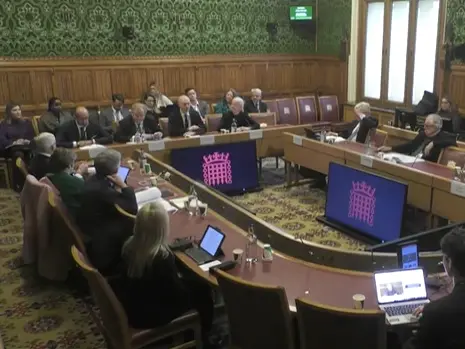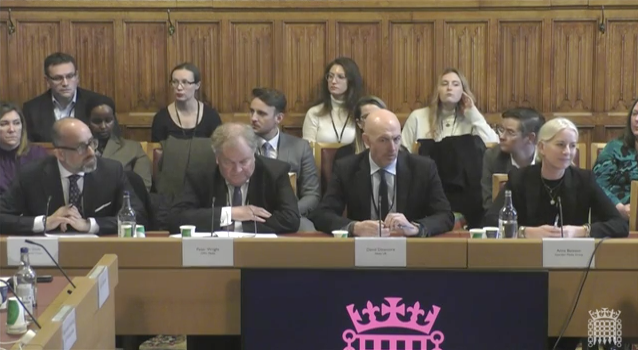
Executives from leading national news publishers have called on the Government to take immediate action to protect the industry from copyright infringement by AI companies.
Two of the four business leaders called on the government to “make it impossible” to train a large language model without brokering content licensing agreements.
Speaking before the House of Lords’ Communications and Digital committee on Tuesday, executives from The Guardian, News UK, Financial Times and DMG Media said action must be put at “the top of the agenda” for lawmakers.
FT calls for AI transparency and safeguards
The executives were gathered to give evidence to an inquiry into “the future of news”, and touched on numerous ways the news industry’s business model is currently facing disruption.
FT chief commercial officer Jon Slade told peers the rapid rise of AI companies was “absolutely a ‘now’ moment”.
He said that although he welcomed the Digital Markets, Competition and Consumers Bill, it had “taken a very long time to come to fruition.
“I certainly hope that’s no indication of the speed with which we can provide greater clarity around copyright law as it relates to artificial intelligence, because the threat of disintermediation is really significant.”
[Read more: Big tech kicks off lobbying effort as UK introduces news payment legislation]
Slade asked Government for “specific clarity to make clear that the use of protected materials by AI systems requires a licence”, adding that regulation should make it clear “that the default is for news publishers to opt-in to the use of [their] data, rather than to opt out”.
The FT official said his company would also like to see AI businesses required to be transparent about the sources of their information and that “accountability and safeguards are introduced to ensure that developers of gen AI systems are accountable for their outputs”, which he said was particularly important from a misinformation standpoint.
Mail publisher: Automatic penalties needed for AI copyright theft
DMG Media editor emeritus Peter Wright agreed, saying: “Make it impossible to train AI unless you have licensing arrangements and potentially you resolve the great news problem of our time by having a reliable and regular source of income for news publishers…
“There must be automatic penalties for people who use your content without permission.”
He warned that generative artificial intelligence “is the dog that eats its own tail”.
“If it develops in the way it looks as though AI developers want it to develop – where they basically just appropriate all our work without any compensation at all – they will destroy the very news content on which their models are trained.
“You will end up with generative AI producing answers to users’ prompts that are fueled entirely by other generative AI, and inaccuracy and bias will just multiply.”
Guardian Media Group chief executive Anna Bateson said “the thing that gives me the most anxiety” about generative AI was what it will do “both to the open web and the way that all information and, pertinently, our journalism is discovered”.
And David Dinsmore, the EVP and chief operating officer at Sun and Times publisher News UK, worried that within “a couple years’ time 90% of the internet will be synthetic…
“What we produce, which I like to describe as the organic farming equivalent of [that synthetic content]… is what we as a country, what we as a democracy would want to, I think, have in our ecosystem.”
He added Government action on copyright protection “must be put at the top of the agenda”.

ICO cookie consent changes could cost Mail Online £41m in UK alone
Dinsmore also raised concerns that new Information Commissioner’s Office rules on cookie options were announced without consulting publishers.
The rules will require websites doing business in the UK to make it as easy for users to reject all third-party cookies as it is to accept them. At present many news publishers offer visitors the choice to either accept all cookies or to click through to a preferences page where they can choose to reject them.
Dinsmore said the move will “crater more and more advertising revenue”.
“These things are done without any consultation, and by the time it gets to us, it’s almost too late… We need to consult together to get the right outcome.”
DMG Media’s Wright agreed, saying the company had been “suddenly told that the user consent mechanisms which have been operating without apparent complaint from our readers for the last five or six years are no longer good enough and you’ve got to change them.
“And you’ve got to change them in a way which gives your users the option to consume your content without paying for it in any way whatsoever – no subscription, no advertising, you’ve just got to give it to them. Nobody expects a supermarket to operate below those rules.”
In a submission to the committee made earlier this month DMG Media said that 93% of Mail Online users hit “accept all” when asked for their cookie preference, whereas “the experience of competitors who have trialled placing ‘Reject All’ with equal prominence to ‘Accept All’ on the first consent screen is that the consent rate drops to 50%”.
DMG Media’s modelling, the submission said, estimates the ICO-mandated changes would produce a 41% drop in monthly ad revenue and, in combination with Apple’s App Tracking Transparency, a revenue drop of “between £27.6m and £40.8m on Mail Online in the UK alone”.
[Read more: Publishers mull ‘consent or pay’ in response to ‘reject all’ cookies button policy]
Sudden big tech algorithm changes can cause ‘seven-figure impact on advertising revenues in a week’
DMG Media’s submission also included details about the expected effect of Google’s forthcoming deprecation of third-party cookies on turnover.
Without the introduction of Google’s Privacy Sandbox – the tech giant’s mooted alternative to cookies, which are currently being trialled with 1% of Chrome users – DMG Media said it anticipated a 35% drop in revenue per thousand impressions. With Privacy Sandbox implemented, its models showed an only slightly better 31% drop.
“From our perspective, Privacy Sandbox appears to be another example of a tech platform using data privacy as a lever to reinforce its own dominant position,” the company said.
Wright complained that publishers’ business relationships with the tech platforms are conducted “on a take it or leave it basis”.
Although DMG Media has a payment for content arrangement in place presently with Google via the News Showcase scheme, he said “they don’t even pretend to represent the value that news in search provides to Google. A sum is named and you can take it or leave it. You don’t even get an explanation of how it’s been arrived at”.
Dinsmore was similarly rankled by the behaviour of the tech giants, saying: “When there is an algorithm change, which you quite often don’t get any notice of and only know it when you see your audience decrease quite significantly at times – this can have a seven-figure impact on advertising revenues in the week. So trying to plan your business, trying to budget, trying to invest for the future becomes increasingly difficult.”
Mail Online paywall figures ‘very promising’
But the executives added that one of the few reliable routes to revenue remaining was high-quality content.
Wright said: “I think one reassuring thing is we’ve launched the partial paywall on Mail Online and the content we put behind it is mostly reasonably serious and specialist journalism and opinion pieces. And people are clearly buying it. It’s early days, but the figures are very promising.
“So if that pattern holds, that will be a clear indicator that quality journalism is attached to revenue, and no doubt we’ll be producing a lot more of it.”
The Guardian’s Bateson added : “The relationship between revenue and actually quality journalism is one of the reasons I think you should be reassured… If the product doesn’t deliver, and if it is just chasing something that you can find for free, or is easily shared or distributed elsewhere, it doesn’t work. So in a way the quality is baked into the the business model, which is I think something that you can draw reassurance from.”
Email pged@pressgazette.co.uk to point out mistakes, provide story tips or send in a letter for publication on our "Letters Page" blog
